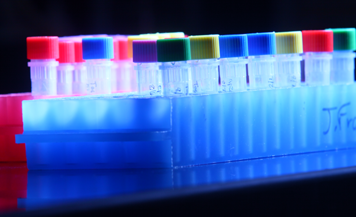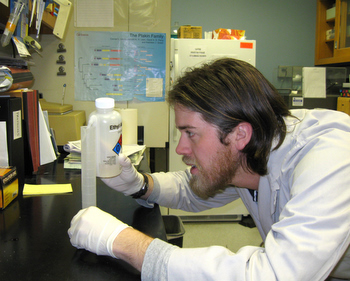IGP Offers Students Flexible Path for Pursuing Scientific Interests While Earning PhD
 |
The Integrated Graduate Program in the Life Sciences (IGP) at Northwestern University Feinberg School of Medicine has been training graduate students in both basic science and clinical research for twenty years. The IGP offers students an integrated, interdepartmental PhD education in nine distinct areas of specialization: cancer biology, cell biology, developmental biology, drug discovery and chemical biology, evolutionary biology, immunology and microbial pathogenesis, molecular biology and genetics, neurobiology, pharmacology and toxicology, and structural biology and biochemistry.
The program is comprised of 135 faculty members from 14 departments of the medical school who devote their considerable research and teaching expertise to ensure that Feinberg students are well prepared for careers as scientists.
“IGP faculty share a dedication to preparing the next generation of scientists,” says William J. Karpus, PhD, Marie A. Fleming Research Professor, professor of pathology and microbiology-immunology and director of the IGP. “These individuals are also devoted to their research and to making scientific discoveries that will impact the health and well-being of our society for decades to come.”
There are approximately 200 students in the IGP working toward their PhD — a five year commitment, on average. All students fulfill the required core curriculum before taking courses that are tailored to their individual research and academic interests. In addition to the coursework, each student completes three research rotations in laboratories — eventually selecting the lab where they will finalize their research project, publish at least one first author, peer-reviewed, original research paper, and complete a written dissertation to earn the PhD degree.
Over the course of their tenure, students acquire writing and presentation skills and participate in a number of training activities, such as research poster presentations, journal clubs and research seminars. Most students also present their research at local, national and international meetings and conferences.
“We aim to attract the highest quality graduate students and provide them with the best opportunities so they can be successful scientists in their chosen careers,” Karpus says.
The majority of IGP graduates complete postdoctoral research in either academia or industry and eventually pursue careers as university faculty members performing basic science, translational and/or clinical research; university faculty members teaching undergraduates; principal scientists at pharmaceutical or biotechnology companies or government laboratories; patent law or financial analysts; or as consultants.
The type of student that matriculates is representative of a spectrum of young scientists, says Karpus. Some students who enter the program have recently graduated with a bachelor’s or master’s degree in biology or chemistry, while others have been in the workforce as research technicians for a number of years and are now seeking to further their research training in order to advance their career.
 |
| Ryan Hobbs, a fifth year student in the Integrated Graduate Program in Life Sciences, studies in the Green lab. |
Ryan Hobbs, an IGP student in his fifth year, earned bachelor’s degrees in both biochemistry and microbiology before coming to Feinberg to focus his training in cell and cellular biochemistry research. Hobbs currently studies in the Green Lab, led by Kathleen J. Green, PhD, Joseph L. Mayberry, Sr., Professor of Pathology and Toxicology.
“While completing my undergraduate studies, I worked in a structural biology lab and realized how much I enjoy being at the forefront of scientific discovery,” says Hobbs. “However, I had several research interests and was unsure as to what field of science to pursue. The IGP program at Feinberg was a great fit for me, because I was able to rotate labs with very different research foci and experience the projects first-hand.”
With his tenure at Feinberg coming to a close, Hobbs is confident that he’s gained the necessary knowledge and experience to pursue a career in scientific discovery. After all, he’s written and received grant fellowships, given presentations at several international conferences and learned what it takes to publish a research article. Hobbs is even the author on two review papers and one Journal of Cell Biology article.
“I will also be submitting two first author publications this winter,” Hobbs says. “And, upon graduation, I am planning to pursue a post-doctoral position in academia with hopes of enjoying a lifelong career as a successful university scientist in the general field of epithelial biology.”
In addition to his research accomplishments in the IGP, Hobbs has been heavily involved with the Chicago Graduate Student Association (CGSA), which hosts academic and social events for graduate students on the Chicago campus, and the Graduate Leadership Council (GLC), which works with University administration to promote a successful educational experience for all Northwestern graduate students.
“My time here in Chicago has been the best,” says Hobbs. “In addition to the diverse culture, the city is also home to numerous sports teams and things to do. I have made so many lifelong friends and couldn’t have asked for much more.”






